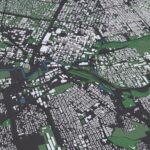Industry Insights: Traffic and Transportation Studies
Outline
Introduction
Traffic and transportation studies are essential for analyzing and improving urban mobility systems. These studies help in designing efficient transportation networks, reducing congestion, and enhancing overall traffic flow.
Importance of Traffic and Transportation Studies
Traffic and transportation studies are crucial for:
- Optimizing Traffic Flow: Enhancing the efficiency of transportation networks and reducing congestion.
- Improving Safety: Identifying and addressing safety issues to reduce traffic accidents and fatalities.
- Planning Infrastructure: Designing and planning transportation infrastructure to meet current and future demands.
- Environmental Impact: Assessing and mitigating the environmental impacts of transportation systems.
- Policy Development: Informing transportation policies and regulations to promote sustainable mobility.
Methodologies
Key methodologies in traffic and transportation studies include:
- Traffic Simulation: Using computer models to simulate traffic conditions and evaluate the impact of different scenarios.
- Traffic Flow Analysis: Analyzing traffic patterns and flow to identify congestion points and propose solutions.
- Travel Demand Forecasting: Predicting future transportation needs based on current trends and demographic data.
- Traffic Impact Studies: Assessing the impact of new developments or changes in infrastructure on traffic conditions.
- Pedestrian and Bicycle Studies: Evaluating the needs and safety of non-motorized transportation users.
Current Trends
Current trends in traffic and transportation studies include:
- Smart Transportation Systems: Implementing technologies like IoT and AI to optimize traffic management and improve transportation efficiency.
- Sustainable Transportation: Promoting eco-friendly transportation options such as electric vehicles and public transit.
- Data-Driven Decision Making: Using big data and analytics to inform transportation planning and policy decisions.
- Multi-Modal Transportation: Integrating various modes of transportation to provide seamless and efficient travel options.
- Urban Mobility Planning: Developing strategies to address the challenges of urbanization and improve city transportation systems.
Future Trends
Future developments in traffic and transportation studies are expected to focus on:
- Autonomous Vehicles: Advancements in self-driving technology and its impact on traffic management.
- Electrification of Transportation: Increased adoption of electric vehicles and charging infrastructure.
- Smart Cities: Integration of transportation systems with smart city technologies to enhance urban mobility.
- Climate Resilience: Developing transportation systems that can adapt to and mitigate the effects of climate change.
Conclusion
Traffic and transportation studies play a vital role in creating efficient and sustainable urban mobility solutions. By staying abreast of current trends and methodologies, cities can enhance their transportation networks and improve quality of life for residents.
Frequently Asked Questions
A traffic simulation uses computer models to replicate traffic conditions and assess the effects of different traffic scenarios.
Traffic studies identify high-risk areas and recommend safety measures to reduce accidents and enhance road safety.
Sustainable transportation options include electric vehicles, public transit, cycling, and walking, which aim to reduce environmental impact.
Multi-modal transportation involves integrating various forms of transportation (e.g., cars, bikes, buses) to provide efficient travel options.
Get in Touch
If you have any questions or need more information about our traffic and transportation studies, feel free to contact us. Our team is here to assist with your transportation planning and management needs.












